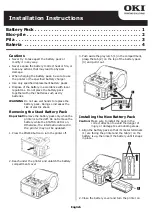
MSL 60, MSL 60/2, CSS 15, CSS 20/45
English
11
Important!
Only use this device to charge batteries that have
been recommended for the device by the manufac-
turer.
The rated voltage of the battery must agree with the
value on the machine.
– The batteries are not charged. They therefore have
to be charged before use.
– A new battery develops full power only after it has
been subjected to approx. 5 charging and dis-
charging cycles.
– The maximum service life of the batteries is
attained if you charge these at an ambient temper-
ature of b5 °C and max. +45 °C.
– If the battery is not within the permitted loading
temperature range (approx. +5 °C and +45 °C)
charging time is extended by the cooling or warm-
up time.
– Important! Batteries will discharge even if the tool is
not used. They should therefore be re-charged reg-
ularly.
Or better still – connect the battery to the mains
charger which will automatically switch to mainte-
nance charging after the battery has been fully
charged. This is particularly useful for maintenance
and for the optimal operational readiness of the
batteries.
– Do not leave the battery in the charger if the latter
is not in operating condition.
If the batteries cannot be charged correctly:
1. Make sure the socket is providing voltage.
2. Make sure the charging points provide good
contact.
3. Should charging still not be possible, please send
the battery and battery charger to our nearest serv-
ice centre.
Notes for the correct use of the battery:
– To ensure long service life, the batteries should
always be charged in good time. This is particularly
important if you notice a reduction in power ouput.
– To obtain the maximum service life, do not
recharge the battery immediately after a short
period of use but, if possible, discharge to the lower
capacity limit and then recharge.
– Avoid to the extent possible the blocking of the
machine. The resulting excessive current flow
leads to quick discharging and increased wear of
the battery.
– An increasingly shorter operating time per recharg-
ing of the battery is an indication that the battery is
worn out and must be replaced.
Do not carry out any repair on the charger yourself!
As a basic rule, return the faulty machine to our next
customer service centre (also in the case of defective
mains cables)!
Use as Intended
The device is only designed for charging Kress NiCd
batteries with voltages between 12 V and 13.2 V.
The application possibilities for the battery charger
can be found in the tabulated overview at the end of
these operating instructions.
Putting into Operation
Remove the battery from the device as described in
the pertaining operating instructions. Re-assemble in
the reverse sequence. Insert the battery into the bat-
tery charger as far as it will go.
Charging Procedure
The charging process begins as soon as the mains
plug is inserted into the power supply socket and the
battery is placed into battery charger slot.
The ”intelligent” battery charger recognises the
charged condition of the battery and switches a fully
charged battery immediately to trickle charging. By
means of this charging process, the battery is pro-
tected and always fully charged.
Rapid charging is only possible when the temperature
of the battery is b5 °C and +45 °C.
The charging unit it suitable for continuous operation.
Display and Key
Blinking green indicator light:
The battery has con-
tact; charging is in progress (max. 60 minutes).
Constant green indicator light:
The battery is
charged; the charger has switched to maintaining
charge.
Constant red light:
The battery is not connected or
too warm. Remove the battery from the charger and
reconnect or allow to cool off to room temperature,
then recommence charging.
Blinking red ligh:
The battery is defective or there is
a short between the charging contacts.
– Remove the battery from the battery charger.
– Pull out the mains plug!
– Check the charging slot for foreign bodies.
3
Charging the batteries
4
Battery charging unit Type: MSL 60
Ladegeräte - Buch Seite 11 Montag, 3. April 2000 2:45 14












































